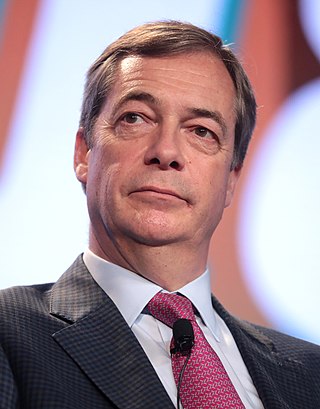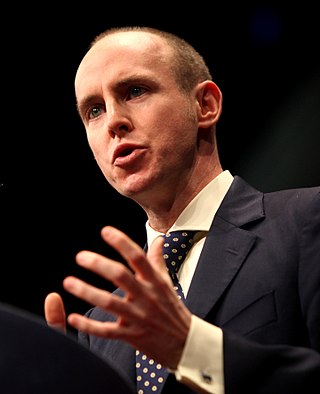
Nigel Paul Farage is a British politician who has served as leader of Reform UK since June 2024, formerly serving as leader from 2019 to 2021. He was the leader of the UK Independence Party (UKIP) from 2006 to 2009 and 2010 to 2016. Farage was the honorary president of Reform UK from 2021 to 2024. He is a presenter for GB News and a candidate for the parliamentary constituency of Clacton. He served as Member of the European Parliament (MEP) for South East England from 1999 until the United Kingdom's exit from the European Union in 2020.

Daniel John Hannan, Baron Hannan of Kingsclere is a British writer, journalist and politician. A member of the Conservative Party, he was a Member of the European Parliament (MEP) for South East England from 1999 to 2020. He is currently a sitting member of the House of Lords where he takes the Conservative whip, and has since 2020 served as an adviser to the Board of Trade. He is the founding president of the Initiative for Free Trade.

Gregory William Hands is a British politician serving as Minister for London and Minister of State for Trade Policy since November 2023. He has served as the Member of Parliament (MP) for Chelsea and Fulham, previously Hammersmith and Fulham, since 2005. A member of the Conservative Party, he served as its Chairman from February to November 2023. Hands has served as Minister of State for Trade Policy under four prime ministers, holding the office on four occasions, and also served as Minister of State for Business, Energy and Clean Growth from 2021 to 2022.

Euroscepticism in the United Kingdom is a continuum of belief ranging from the opposition to certain political policies of the European Union to the complete opposition to the United Kingdom’s membership of the European Union. It has been a significant element in the politics of the United Kingdom (UK). A 2009 Eurobarometer survey of EU citizens showed support for membership of the EU was lowest in the United Kingdom, alongside Latvia and Hungary.

Relations between the European Union (EU) and the United Kingdom of Great Britain and Northern Ireland (UK) are governed, since 1 January 2021, by the EU–UK Trade and Cooperation Agreement (TCA).

The United Kingdom European Union membership referendum also known as the EU referendum or the Brexit referendum, took place in the United Kingdom (UK) and Gibraltar on 23 June 2016 to ask the electorate whether the country should remain a member of, or leave, the European Union (EU). The referendum resulted in 51.9% of the votes cast being in favour of leaving the EU, triggering calls to begin the process of the country's withdrawal from the EU commonly termed "Brexit".

Brexit was the withdrawal of the United Kingdom (UK) from the European Union (EU). Following a referendum on 23 June 2016, Brexit officially took place at 23:00 GMT on 31 January 2020. The UK is the only sovereign country to have left the EU. The UK had been a member state of the EU or its predecessor, the European Communities (EC), since 1 January 1973. Following Brexit, EU law and the Court of Justice of the European Union no longer have primacy over British laws. The European Union (Withdrawal) Act 2018 retains relevant EU law as domestic law, which the UK can amend or repeal.

Vote Leave was a campaigning organisation that supported a "Leave" vote in the 2016 United Kingdom European Union membership referendum. On 13 April 2016 it was designated by the Electoral Commission as the official campaign in favour of leaving the European Union in the Referendum.
A number of politicians, public figures, newspapers and magazines, businesses and other organisations endorsed either the United Kingdom remaining in the EU or the United Kingdom leaving the EU during the 2016 United Kingdom European Union membership referendum.

Campaigning in the United Kingdom European Union membership referendum began unofficially on 20 February 2016 when Prime Minister David Cameron formally announced under the terms of the European Union Referendum Act 2015 that a referendum would be held on the issue of the United Kingdom's membership of the European Union. The official campaign period for the 2016 referendum ran from 15 April 2016 until the day of the poll on 23 June 2016.
Issues in the United Kingdom European Union membership referendum, 2016 are the economic, human and political issues that were discussed during the campaign about the withdrawal of the United Kingdom from the European Union, during the period leading up to the Brexit referendum of 23 June 2016. [Issues that have arisen since then are outside the scope of this article].
International reactions to the United Kingdom European Union membership referendum of 2016 are the reactions to the decision to leave the European Union by the United Kingdom. The main reaction was on global financial markets experiencing extreme volatility.
After the British EU membership referendum held on 23 June 2016, in which a majority voted to leave the European Union, the United Kingdom experienced political and economic upsets, with spillover effects across the rest of the European Union and the wider world. Prime Minister David Cameron, who had campaigned for Remain, announced his resignation on 24 June, triggering a Conservative leadership election, won by Home Secretary Theresa May. Following Leader of the Opposition Jeremy Corbyn's loss of a motion of no confidence among the Parliamentary Labour Party, he also faced a leadership challenge, which he won. Nigel Farage stepped down from leadership of the pro-Leave party UKIP in July. After the elected party leader resigned, Farage then became the party's interim leader on 5 October until Paul Nuttall was elected leader on 28 November.

On 29 March 2017, the United Kingdom (UK) invoked Article 50 of the Treaty on European Union (TEU) which began the member state's withdrawal, commonly known as Brexit, from the European Union (EU). In compliance with the TEU, the UK gave formal notice to the European Council of its intention to withdraw from the EU to allow withdrawal negotiations to begin.
The economic effects of Brexit were a major area of debate during and after the referendum on UK membership of the European Union. The majority of economists believe that Brexit has harmed the UK's economy and reduced its real per capita income in the long term, and the referendum itself damaged the economy. It is likely to produce a large decline in immigration from countries in the European Economic Area (EEA) to the UK, and poses challenges for British higher education and academic research.

The United Kingdom's post-Brexit relationship with the European Union and its members is governed by the Brexit withdrawal agreement and the EU–UK Trade and Cooperation Agreement. The latter was negotiated in 2020 and has applied since January 2021.
Brexit is the commonly used term for the United Kingdom's withdrawal from the European Union on 31 January 2020, which resulted from a referendum on 23 June 2016. This article details the mostly critical response to this decision in the visual art, novels, theatre, and film.

In 2016, the impact of Brexit on the European Union (EU) was expected to result in social and economic changes to the Union, but also longer term political and institutional shifts. The extent of these effects remain somewhat speculative until the precise terms of the United Kingdom's post-Brexit relationship with the EU becomes clear. With an end to British participation in the EU's policies on freedom of movement of goods, persons, services, and capital, and the European Union Customs Union, as well as sharing criminal intelligence and other matters, there is a clear impact with consequences for both institutions.
Since the United Kingdom's vote to leave the European Union in the 2016 referendum, a number of demonstrations have taken place and organisations formed whose goal has been to oppose, reverse or otherwise impede that decision.

Following a 2016 referendum, the United Kingdom exited from the European Union at the end of January 2020. Since leaving the EU, numerous polling organisations have conducted surveys to gauge public opinion on rejoining the organisation. The trend of the poll data shows that, over time, support for Brexit has waned, while public opinion in the UK has gradually moved in favour of rejoining the EU.










